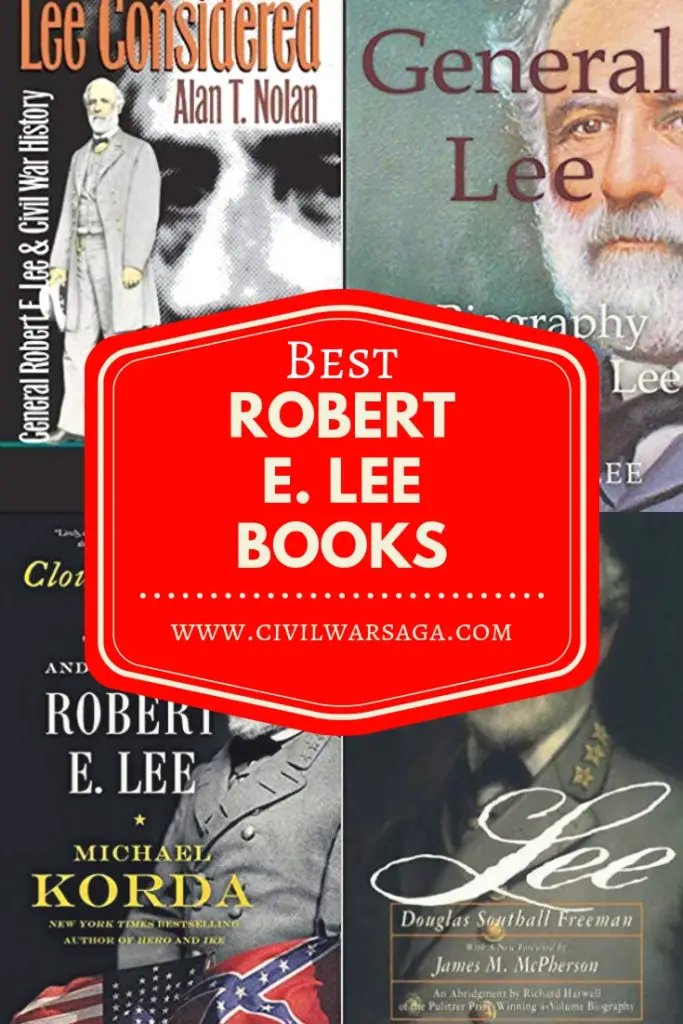Robert E. Lee is an iconic and controversial figure which countless books have been written about since days of the Civil War.
Some of these books are a full account of Lee’s life while others focus solely on specific aspects of his life such as his personal thoughts and opinion’s as expressed in his private papers or his public image and how it came to be what is today.
To help you figure out which books to read, I’ve created this list of the best books about Robert E. Lee.
These books all have great reviews on sites like Amazon and Goodreads and many of them are best-sellers and have great reviews from critics.
I’ve also used many of these books in my research for this website so I can personally say they are some of the best on the topic.
The following is a list of the best books about Robert E. Lee:
(Disclaimer: This article contains Amazon affiliate links. As an Amazon Associate I earn from qualifying purchases.)

1. R.E. Lee by Douglas Southall Freeman
Published in 1934, this four-volume book by Douglas Southall Freeman chronicles all of the major events and highlights of Robert E. Lee’s military career.
The book discusses everything from Lee’s experiences in the Mexican-War to his surrender at Appomattox. Freeman depicts Lee as an honest, straightforward man who is “one of the small company of great men in whom there is no inconsistency to be explained, no enigma to be solved.”
The book received positive reviews when it was published. The New York Times referred to the entire work as “Lee Complete for All Time” while Stephen Vincent Benet’s review in the New York Herald Tribune referred to it as a “a complete portrait – solid, vivid, authoritative, and compelling.”
The book is now considered the definitive biography of Robert E. Lee.
Douglas Southall Freeman, who died in 1953, was a newspaper editor, military analyst, and a pioneering radio broadcaster.
In addition to his biography about Lee, Freeman also wrote a highly acclaimed six-volume biography of George Washington.
Freeman won two Pulitzer Prizes, one in 1935 for his biography of Robert E. Lee and one in 1958 (posthumously) for his biography of George Washington.
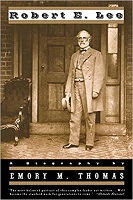
2. Robert E. Lee: A Biography by Emory M. Thomas
Published in 1995, this book by Emory M. Thomas explores the real Robert E. Lee, not the legend that he became.
Thomas argues that Lee’s image has been distorted over the years partly due to his own hidden nature and partly due to the myths and legends that surround him.
In the book’s foreward, Thomas goes on to say that Lee was a complex, mysterious man and to truly understand him you need to look into his inner character:
“Lee, the enigma, seldom if ever revealed himself while he lived. To understand him, it is necessary to look behind his words and see, for example, the true nature of the lighthouse keeper Lee encountered during his surveying mission in 1835. It is also important to peer beyond Lee’s words and recall what he did as well as what he said. Sometimes the existential Lee contradicted the verbal Lee.”
Thomas also points out that the real Robert E. Lee has been overshadowed by the legend that he later became:
“In addition to looking behind and beyond his words, it is well to remember that Lee once possessed of flesh and blood. This is important because so many have made so much of Lee during the years since he lived that legend, image and myth have supplanted reality. Lee has become a hero essentially smaller than life.”
The book received positive reviews when it was published. A review in Publisher’s Weekly “highly recommended” the book due to its unique take on this iconic figure:
“Synthesizing printed and manuscript sources, he presents Lee as neither the icon of Douglas Southall Freeman nor the flawed figure presented by Thomas Connolly. Lee emerges instead as a man of paradoxes, whose frustrations and tribulations were the basis for his heroism. Lee’s work was his play, according to the author, and throughout his life he made the best of his lot…Highly recommended.”
A review by Kirkus Reviews praised the book for presenting a fair and balanced view of this controversial figure:
“A comprehensive new biography that seeks to give a balanced portrait of the famed Confederate general. Thomas undertakes a daunting task here, seeking to recover the real, living human from the mythology surrounding Lee since his death in 1870. In this effort he hews a middle ground between early 20th century hagiographies and revisionist contemporary interpretations…Well written and based largely on primary documentation, a good effort at understanding a complex personality.”
A review by Patrick T. Reardon in the Chicago Tribune called the book an “interesting, readable examination of Lee’s life” but states that it “leaves the general still very much a mystery.”
A review in the New York Review of Books called it “The best and most balanced of the Lee biographies.”
Emory M. Thomas is Regents Professor of History Emeritus at the University of Georgia.
Thomas is also the author of eight books about the Civil War era, which include The Confederate Nation: 1861-1865; The Confederacy as a Revolutionary Experience; Travels to Hallowed Ground: A Historian’s Journey to the American Civil War; Bold Dragoon: The Life of J.E.B. Stuart; The Confederate State of Richmond: A Biography of the Capital; The Dogs of War: 1861; The American War and Peace: 1860-1877.
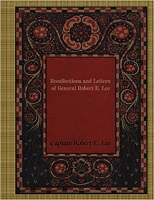
3. Recollections and Letters of Robert E. Lee by Captain Robert Edward Lee
Published in 1904, this book is a collection of documents compiled by Captain Robert Edward Lee, the son of General Robert E. Lee.
The book covers Lee’s service in the U.S. Army prior to the Civil War, his service in the Confederate States Army, his letters to his family, his life after the war as a private citizen and his opinions on the war and reconstruction as well as his last days before his death in 1870.
Captain Robert E. Lee was the youngest of General Lee’s three sons. In 1862, Lee served as a private in the Rockbridge Artillery before he was promoted to the rank of Captain, after the Battle of Sharpsburg, and then promoted to major general and aide-de-camp to Confederate President Jefferson Davis.
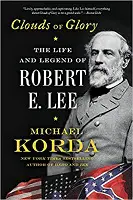
4. Clouds of Glory: The Life and Legend of Robert E. Lee by Michael Korda
Published in 2014, this book by Michael Korda is a full-scale biography of Lee’s life and military career.
The book attempts to dispel the myths surrounding Lee to reveal the true human being underneath. In the book, Korda describes Lee as a serious, hard-working military man with a surprisingly fun side:
“A perfectionist, obsessed by duty and by the value of obedience, he might have been a grim figure, except for the fact that he had another side, charming, funny, and flirtatious. The animal lover, the gifted watercolorist, the talented cartographer – the topographic maps he drew for the Corps of Engineers are works of art, as are the cartoons he drew for his children in Mexico. The father who adored having his children get into bed with him in the morning, and telling them stories, or having them tickle his feet; the adoring husband; the devoted friend – these are all facets of the same man. He was the product of a rationalist education and at the same time a romantic, who sought for a spiritual answer to the problems of life – a man of contradictions, whose natural good manners and courtly bearing disguised his lifelong soul-searching.”
The book received positive reviews when it was published. A review by David Shribman in the Boston Globe described it as “Lively, approachable, and captivating…Like Lee himself, everything about Clouds of Glory is on a grand scale” while Publisher’s Weekly referred to it as “superbly engaging.”
Kirkus Reviews called it “A masterful biography of the beloved Civil War general…Lee is a man for the ages, and Korda delivers the goods with this heart-wrenching story of the man and his state” and a review by David Holahan in the Christian Science Monitor stated “Korda clearly has command of his subject…[Clouds of Glory] is well-considered and amply documented. Military buffs will find much to feast on.”
Yet, other reviewers were a little more reserved in their praise. Historian Eric Foner reviewed the book for the Washington Post and took issue with Korda’s grasp of the broader issues of the Civil War and Lee’s attitude towards them:
“When it comes to the broader historical context, Korda sometimes falters. He does not display familiarity with recent literature on the Civil War era. For example, the one book he cites on desertion from the Confederate armies, a subject of considerable recent scholarship, was written in 1924. Korda notes that Lee’s views on slavery and race have too often been ‘swept under the rug,’ but his own discussion is scattered and incomplete…Although Korda describes him as a political moderate, there was nothing moderate in Lee’s stance during the 1860 presidential campaign… Toward the end of the Civil War, Lee came to accept the necessity of enlisting black soldiers in the Confederate armies; a handful were enrolled a month before the surrender at Appomattox. Yet, Korda notes, his racial views ‘never changed.’ Unfortunately, the book fails to devote sufficient attention to Lee’s appearance in 1866 before the congressional Joint Committee on Reconstruction, which showed him at his worst.”
A review by historian Fergus M. Bordewich in the New York Times also points out these inconsistencies as well as a number of glaring factual errors, yet still referred to the book as an ”admiring and briskly written biography…”
Michael Korda is a British author and former editor-in-chief of Simon and Schuster. Korda has written a number of history books, including Hero: The Life and Legend of Lawrence of Arabia; Alone: Britain, Churchill, and Dunkirk: Defeat Into Victory; With Wings Like Eagles: The Untold Story of the Battle of Britain; Ike: An American Hero; Journey to a Revolution: A Personal Memoir and History of the Hungarian Revolution of 1956.
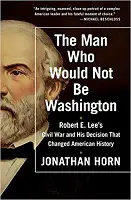
5. The Man Who Would Not Be Washington by Jonathan Horn
Published in 2015, this book by Jonathan Horn is about Lee’s complicated connection to George Washington.
In the prologue, Horn argues that although Lee is often compared to his famous great-grandfather-in-law, George Washington, Lee’s decision to fight against the United States negates this comparison:
“The connections between Washington and Lee are neither mystic nor manufactured. Lee was not the second coming of Washington, but he might have been had he chosen differently. As Washington was the man who would not be king, Lee was the man who would not be Washington. The story that emerges when viewed in this light is more complicated, more tragic, and more illuminating.”
The book received positive reviews when it was published. A review by USA Today called it compelling:
“Compelling….a modern and readable perspective on Lee’s enigmatic character” while the Pittsburg Post Gazette declared “The resulting work is well-written, fair-minded and short.”
A review by Publisher’s Weekly called the book captivating:
“Horn, a former White House speechwriter, puts a captivating spin on Lee’s story by comparing and contrasting the two great men. Detailed yet accessible descriptions of battles are coupled with stories of Lee’s personal life, revealing a man as complex as the war he reluctantly joined…Horn takes a fair and equitable approach to Lee, his life, and his struggle over participation in a war that tore apart the nation.”
A review by Kirkus Reviews praised the book for its compelling research but criticized its presentation:
“A romantic, rueful portrait of the Confederate general and the fatal decision that shut him out of history. Former White House speechwriter Horn finds Robert E. Lee (1807-1870) a deeply sympathetic American hero whom fortune seemed to have favored as heir to George Washington, if only Lee had thrown his lot with the Union rather than the South…Compelling research within an overwrought presentation.”
A review in the Kent State University Press also praised the book’s research:
“By design, Horn’s book is a limited biography of Lee. Whole chapters of Lee’s life, for example his engineering work on the Mississippi, receive only a sentence or two. But his central point, the Washington-Lee dynamic, is well researched and thoroughly developed. Whether Horn has made his case convincingly is for each reader to decide.”
Jonathan Horn is a former speechwriter for George W. Bush and journalist whose writing has appeared in The Washington Post, The New York Times and the Weekly Standard. The Man Who Would Not Be Washington is Horn’s first book.

6. Crucible of Command: Ulysses S. Grant and Robert E. Lee – The War They Fought, the Peace They Forgot by William C. Davis
Published in 2014, this book by William C. Davis is about how Ulysses S. Grant and Robert E. Lee became the famous commanders that they were.
Davis explains in the book’s preface that the work is not a traditional biography that chronicles the timeline of their lives but instead follows their personal development as military leaders:
“This is not a conventional biography. It is, rather, an exploration of the origins and development of Grant’s and Lee’s personalities and characters, their ethical and moral compasses, and their thinking processes and approaches to decision making – in short, the things that made them the kind of commanders they became.”
Yet, Davis goes on to explain that the book still has new information and insight from newly discovered and previously ignored sources, especially on Lee and Grant’s youth.
The book received positive reviews when it was published. A Review by Russell S. Bonds in the Wall Street Journal called the book “Brilliant…smoothly written and…scrupulously even handed” while Publisher’s Weekly declared “This meticulously researched, well-written book greatly enriches our understanding of each of these extraordinary figures.”
A review by Kirkus Reviews called it “A fresh look at the sources and a careful eye to leadership and character places this book high atop the list of recent Civil War histories.”
A review by Joseph C. Goulden in the Washington Times stated “The most avid of Civil War buffs will relish the revealing details in a book rich in authenticity and readability.”
William C. Davis is a retired Virginia Tech history professor and the author of numerous books about the Civil War, including The Cause Lost: Myths and Realities of the Confederacy; Look Away: A History of the Confederate States of America; Jefferson Davis: The Man and His Hour: Civil War Cookbook; as well as other history books.
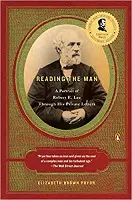
7. Reading the Man: A Portrait of Robert E. Lee Through His Private Letters by Elizabeth Brown Pryor
Published in 2007, this book by Elizabeth Brown Pryor takes a closer look at Robert E. Lee through his unpublished private letters.
In the book’s preface, Pryor explains that the book is not meant to be a full-scale biography but is instead a behind the scenes glimpse at Lee through his own words;
“Although this book is filled with new material, it is not meant to be a sensationalist biography. Nor is it a cradle-to-grave chronology, a detailed description of military movements, or an exhaustive analysis of the Civil War. Those books have already been written. Debunking the Lee mythology is also not the point of this book. Rather, it is to amplify our understanding of what constitutes heroism, and how as an ordinary person Lee faced the vagaries of the human condition. These letters help us to understand his prominence and to move out of our own moment to connect with a larger collective experience.”
The book received positive reviews when it was published. Historian David Blight reviewed it for the Boston Globe and praised its unique take on this controversial figure:
“An unorthodox, critical, and engaging biography. . . . [Pryor] impressively captures Lee’s character and personality.”
A review by Fergus M. Bordewich in the Wall Street Journal also praised the book for capturing Lee’s complexity:
“Pryor has taken an icon and given us the soul of a complex man and his turbulent age.”
Fellow Lee biographer, William C. Davis, wrote in the preface to his own book, Crucible of Command, that Pryor’s book is well-researched although he faulted her for occasionally making unwarranted assumptions:
“Elizabeth Pryor’s 2007 Reading the Man: A Portrait of Robert E. Lee Through His Private Letters is exhaustively researched and in the main an outstanding exploration of the inner Lee, often through writings not previously available, though she sometimes makes unwarranted leaps of interpretation from her sources.”
Elizabeth Brown Pryor, who died unexpectedly in an accident in 2015, was a former U.S. Diplomat who worked for the Department of State. Pryor is also the author of Clara Barton: Professional Angel and Six Encounters With Lincoln: A President Confronts Democracy and Its Demons, which was published posthumously in 2017.
In 2007, Pryor won the 2007 Jefferson Davis Award and the Richard S. Slatten Award for Excellence in Virginia Biography for Reading the Man and, in 2008, also won the Lincoln Prize and the Richard B. Harwell Book Award.
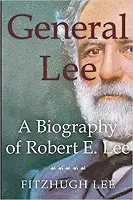
8. General Lee: A Biography of Robert E. Lee by Fitzhugh Lee
Published in 1894, this book by Fitzhugh Lee, Robert’s E. Lee’s nephew, chronicles Lee’s life using his unpublished private letters.
The book briefly discusses Lee’s family history before delving deep into the events of his military career. Fitzhugh Lee explains, in the book’s preface, that since General Lee never wrote a memoir, this book is an attempt to tell Lee’s story through his own words:
“In this volume the attempt has been made to imperfectly supply the great desire to have something from Robert E. Lee’s pen, by introducing, at the periods referred to, such extracts from his private letters as would be of general interest. He is thus made, for the first time, to give his impressions and opinions on most of the great events with which he was so closely connected.”
Despite being published over 100 years ago, the book is still a big seller and is highly recommended by fans of Robert E. Lee.
Fitzhugh Lee was a general in the U.S. army during the Spanish-American war and a cavalry general for the Confederate States Army during the American Civil War.
In addition to General Lee: A Biography, Fitzhugh Lee also wrote another book, titled Cuba’s Struggle Against Spain, as well as an article about General Lee.

9. Lee Considered: General Robert E. Lee and Civil War History by Alan T. Nolan
Published in 1991, this book by Alan T. Nolan debunks the myths and legends about Lee to set the record straight about this iconic figure.
As Nolan explains in the preface, the book does not give a full account of Lee’s life and instead examines the legend of Robert E. Lee and uses evidence to prove or disprove specific claims about him:
“This book is not, therefore, a biography and offers no full account of Robert E. Lee’s life. It is, instead, an examination of major aspects of the tradition that identifies Lee in American history. In raising questions and drawing conclusions about this tradition, I have attempted to set fort the evidence. The reader who thinks I am asking the wrong questions or disagrees with my conclusions may, in evaluating my thesis, consider the evidence on which it is based. This evidence does not include any new or sensational facts or new primary materials. On the contrary, my inquiry concerns what the familiar and long-available evidence actually establishes about Robert E. Lee. The results of my inquiry are not so much an expose as simply an attempt to set the record straight.”
The book received positive reviews when it was published. A review by Peter Andrews in the Washington Post stated that although he believed the book wouldn’t appeal to a wide audience, it is a must-read for Lee historians:
“However, any future author dealing with Lee will have to face up to Nolan’s material and we will all be the better for it. A man struggling with his times, his prejudices and his sense of honor makes a more arresting subject than a public figure who forever seems to be speaking in copybook maxims.”
Yet, historian James McPherson reviewed the book for the New York Review of Books and accused Nolan of being disingenuous in his claim that the book was not intended to defame Lee:
“But this disclaimer of bias is a bit disingenuous. Nolan is a lawyer by profession. The book has something of the tone of an indictment of Lee in the court of history, with the author as prosecuting attorney. He wants the jury—his readers—to convict Lee of entering willingly into a war to destroy the American nation.”
McPherson goes on to say though that despite this the book presents a more realistic view of Lee than the legends do:
“There is truth in some of these charges; it is not the whole truth, however. Nolan’s portrait of Lee may be closer to the real Lee than the flawless marble image promoted by tradition. But the prosecutorial style of his book produces some new distortions.”
Alan T. Nolan is a former lawyer and author of numerous books about the Civil War, including The Iron Brigade: A Military History; Giants in Their Tall Hats: Essays on the Iron Brigade; Rally, Once Again!: Selected Civil War Writings.

10. Marble Man: Robert E. Lee and His Image in American Society by Thomas Lawrence Connelly
Published in 1977, this book by Thomas Lawrence Connelly explores how the image of Robert E. Lee has changed since the Civil War.
As Connelly explains in the preface, the book is not a biography of Lee’s life but an analysis of how and why his public image changed:
“This book is an attempt to probe the image of Robert E. Lee in the American mind, from its origins among Lost Cause writers in the Reconstruction years to the era of the 1961-65 Civil War Centennial, when Lee became a hero to white middle class America. I am also endeavoring to test the Lee image for possible distortion and to rep-praise Lee himself as well. While there have been many biographies of Robert E. Lee, no one has seriously explored the process by which his image has developed since the Civil War.”
Connelly goes on to explain that Lee’s image has become distorted over the years and as a result the real Lee has been obscured:
“In truth, Lee was an extremely complex individual. Lee the man has become so intermingled with Lee the hero symbol that the real person has been obscured. Efforts to understand him, and to appraise his capabilities fairly, have been hindered by his image as a folk hero.”
The book was the first to deconstruct the myth of Robert E. Lee and was considered groundbreaking and controversial when it was published.
The book received positive reviews from critics. A review in the Washington Post called the it “An engaging, provocative book. . . . As a study of symbol-making [it] is first-rate.”
A review by the now defunct Saturday Review of Literature called it fascinating:
“Connelly provides a fascinating insight into the historical press-agentry through which Lee was enshrined as…an exemplar of American virtues.”
A review by Kirkus Reviews praised the book for its professionalism and insight:
“Connelly conveys these themes with a professionalism that will enable readers to discriminate among his views of Lee, earlier commentators’, and his view of the latter; what could have been a merely useful compilation of propaganda is transformed by Connelly’s own evaluations into a highly substantive and challenging work.”
A review by Julie K. Wilkinson in the The Annals of Iowa journal praised the book for its research yet stated it was a little lacking when it came to analysis:
“Through exhaustive research, Connelly effectively illustrates the Lee image which emerged from newspaper, popular and scholarly magazine, manuscript, fictional, oral, radio, and poetic accounts of the General. Shortcomings of The Marble Man are the attempts to discover why the image developed and then to compare it with the real person, Robert E. Lee.”
Thomas Lawrence Connelly, who died in 1991, was a professor of history at the University of South Carolina. Connelly wrote numerous books about the Civil War, including The Politics of Command: Factions and Ideas in Confederate Strategy; Autumn of Glory: The Army of Tennessee, 1862-1865; Army of Heartland: The Army of Tennessee, 1861-1862; Civil War Tennessee: Battles and Leaders; God and General Longstreet: The Lost Cause and the Southern Mind.
Sources:
Wilkinson, Julie. “The Marble Man: Robert E. Lee and His Image in American Society.” The Annals of Iowa, State Historical Society of Iowa, vol. 44, no. 5, summer 1978, pps. 408-408, ir.uiowa.edu/cgi/viewcontent.cgi?referer=https://www.google.com/&httpsredir=1&article=8568&context=annals-of-iowa
Carmichael, Peter S. “CWT Book Review: Lee Considered.” History.net, 16 March. 2018, www.historynet.com/cwt-book-review-lee-considered.htm
Andrews, Peter. “Book World – Lee Considered.” Washington Post, 8 July. 1991, www.washingtonpost.com/archive/lifestyle/1991/07/08/book-world/7e9be165-279d-4973-81e6-4643d21b16cb/?noredirect=on&utm_term=.f56cb4917a8e
McPherson, James. “How Noble Was Robert E. Lee.” New York Review of Books, 7 Nov. 1991, www.nybooks.com/articles/1991/11/07/how-noble-was-robert-e-lee/
Faust, Drew Gilpin. “Lee Without Tears.” New York Times, 7 July. 1991, www.nytimes.com/1991/07/07/books/lee-without-tears.html
Bordewich, Fergus M. “Discovering the Real Robert E. Lee.” Wall Street Journal, 15 May. 2007, www.wsj.com/articles/SB117918601842902577
Blight, David. “In a Celebrated Life, Shades of Gray.” Boston Globe, 29 July. 2007, archive.boston.com/ae/books/articles/2007/07/29/in_a_celebrated_life_shades_of_gray/
Barney, William L.”Crucible of Command: Ulysses S. Grant and Robert E. Lee—The War They Fought, the Peace They Forged by William C. Davis (review).” Journal of Southern History, vol. 82 no. 1, 2016, pp. 176-177. Project MUSE, muse.jhu.edu/article/611092/pdf
Wert, Jeffry D. “Davis: Crucible of Command (2015).” Civil War Monitor, 12 Aug. 2015, www.civilwarmonitor.com/book-shelf/davis-crucible-of-command-2015
“Review: Crucible of Command.” Bob On Books, 25 May. 2015, bobonbooks.com/2015/05/25/review-crucible-of-command/
Barra, Allen. “Book Review: Crucible of Command – Ulysses S. Grant and Robert E. Lee.” Historynet.com, 9 Dec. 2014, www.historynet.com/book-review-crucible-of-command-ulysses-s-grant-and-robert-e-lee.htm
“Crucible of Command by William C. Davis.” Kirkus Reviews, 21 Dec. 2014, www.kirkusreviews.com/book-reviews/william-c-davis/crucible-of-command/
Goulden, Joseph C. “The Civil War and the Generals Who Fought It.” Washington Times, 20 April. 2015, www.washingtontimes.com/news/2015/apr/20/book-review-crucible-of-command-ulysses-s-grand-an/
Bonds, Russell S. “The Odd Couple.” Wall Street Journal, 6 March. 2015, www.wsj.com/articles/book-review-crucible-of-command-by-william-c-davis-1425677492
Carrigan, Henry L., Jr. “The Man Who Would Not Be Washington by Jonathan Horn.” BookPage, bookpage.com/reviews/17608-jonathan-horn-man-who-would-not-be-washington-history
Dotinga, Randy. “Robert E. Lee and George Washington Do Not Equate, Says Lee Biographer Jonathan Horn.” Christian Science Monitor, 7 Sept. 2017, www.csmonitor.com/Books/chapter-and-verse/2017/0907/Robert-E.-Lee-and-George-Washington-do-not-equate-says-Lee-biographer-Jonathan-Horn
Barcousky, Len. “’The Man Who Would Not Be Washington’: Robert E. Lee embraces Virginia at the expense of the country he loved.” Pittsburg Post-Gazette, 1 March. 2015, www.post-gazette.com/ae/books/2015/03/01/The-Man-Who-Would-Not-Be-Washington-Robert-E-Lee-embraces-Virginia-at-the-expense-of-the-country-he-loved/stories/201503010062
“Nonfiction Book Review: The Man Who Would Not Be Washington by Jonathan Hom.” Publisher’s Weekly, www.publishersweekly.com/978-1-4767-4856-6
“The Man Who Would Not Be Washington by Jonathan Hom.” Kirkus Reviews, 2 Nov. 2014, www.kirkusreviews.com/book-reviews/jonathan-horn/the-man-who-would-not-be-washington/
Bailey, Greg. “The Man Who Would Not Be Washington: Robert E. Lee’s Civil War and His Decision That Changed American History by Jonathan Horn (review).” Civil War History, vol. 61 no. 4, 2015, pp. 455-456. Project MUSE, muse.jhu.edu/article/597689
Holahan, David. “Clouds of Glory.” Christian Science Monitor, 12 May. 2014, www.csmonitor.com/Books/Book-Reviews/2014/0512/Clouds-of-Glory
“Clouds of Glory by Michael Korda.” Kirkus Reviews, 30 March. 2014, www.kirkusreviews.com/book-reviews/michael-korda/clouds-of-glory-life/
“Nonfiction Book Review: Clouds of Glory: The Life and Legend of Robert E. Lee by Michael Korda.” Publisher’s Weekly, www.publishersweekly.com/978-0-06-211629-1
Shribman, David. “’Clouds of Glory’ by Michael Korda.” Boston Globe, 17 May. 2014, www.bostonglobe.com/arts/books/2014/05/17/review-clouds-glory-michael-korda/hs2q7pt1kaZSBBEoXs212K/story.html
Foner, Eric. “Book Review: ‘Clouds of Glory: the Life and Legend of Robert E. Lee’ by Michael Korda.” Washington Post, 30 May. 2014, www.washingtonpost.com/opinions/book-review-clouds-of-glory-the-life-and-legend-of-robert-e-lee-by-michael-korda/2014/05/30/cba1d004-c973-11e3-95f7-7ecdde72d2ea_story.html?noredirect=on&utm_term=.20ee0c7f1ea7
Bordewiche, Fergus M. “Ghost of the Confederacy.” New York Times, 27 June. 2014, www.nytimes.com/2014/06/29/books/review/clouds-of-glory-michael-kordas-robert-e-lee-biography.html
Rable, George C. “The Journal of Southern History.” The Journal of Southern History, vol. 62, no. 4, 1996, pp. 809–811. JSTOR, www.jstor.org/stable/2211160.
Reardon, Patrick. “Emory Thomas Paints a 3rd View of Enigmatic Robert E. Lee.” Chicago Tribune, 10 Sept. 1995, www.chicagotribune.com/news/ct-xpm-1995-09-10-9509100037-story.html
“Robert E. Lee by Emory M. Thomas.” Kirkus Review, www.kirkusreviews.com/book-reviews/emory-m-thomas/robert-e-lee/
“Nonfiction Book Review: Robert E. Lee: A Biography.” Publisher’s Weekly, www.publishersweekly.com/978-0-393-03730-2
Thompson, Charles Willis. “Robert E. Lee: A Final Portrait.” New York Times Book Review, 14 Oct. 1934.
Thompson, Charles Willis. “Dr. Freeman Concludes his Monumental Life of Lee.” New York Times Book Review, 10 Feb. 1935.
Benet, Stephen Vincent. “Great General, Greater Man: Robert E. Lee.” New York Herald Tribune, 10 Feb. 1935.
Tate, Allen. “The Definitive Lee.” The New Republic, 19 Dec. 1934.
Commager, Henry Steele. “New Books in Review: The Life of Lee.” The Yale Review, vol. XXIV, no. 3 (March 1935), 594.
Malone, Dumas. “Review of R.E. Lee.” American Historical Review, vol. XL, no. 3, (April 1935), 534.
Malone, Dumas. “Review of R.E. Lee.” American Historical Review, vol. XLI, no. 1, (October 1935), 164.
Johnson, David E. Douglas Southall Freeman. Pelican Publishing Company, 2002.
“30 Great Books About Ulysses S. Grant and Robert E. Lee.” About Great Books, www.aboutgreatbooks.com/topics/history/ulysses-s-grant-robert-e-lee/
Reeves, John. “7 Essential Books on Robert E. Lee.” Medium, 15 Aug. 2017, medium.com/@reevesjw/7-essential-books-on-robert-e-lee-dae455bc7bcf

